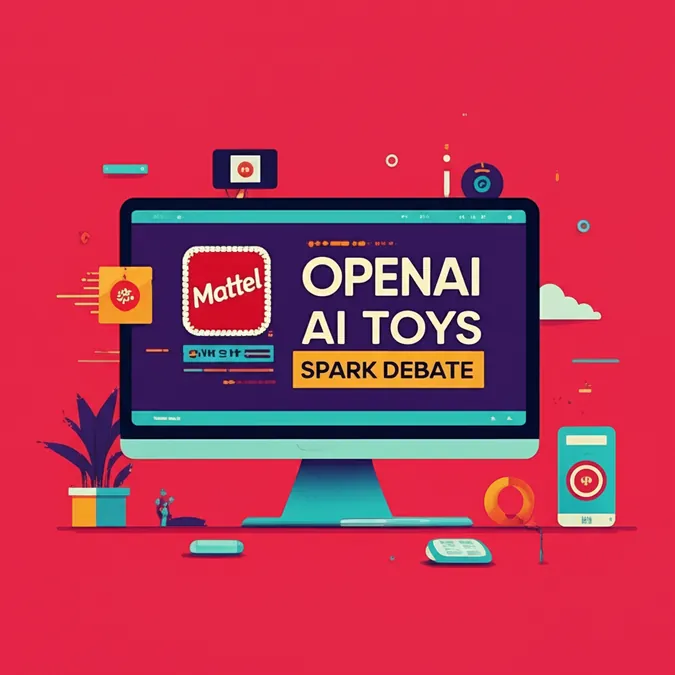Developer Offer
Try ImaginePro API with 50 Free Credits
Build and ship AI-powered visuals with Midjourney, Flux, and more — free credits refresh every month.
Tech Roundup AI Milestones Robot News Future Innovations
AI Frontiers and Discussions
This week, the world of Artificial Intelligence saw significant announcements and ongoing debates about its future trajectory.
Meta's Pursuit of Superintelligence
Meta is reportedly establishing a new artificial intelligence research lab. Their goal is to pursue 'superintelligence,' a theoretical AI system with capabilities exceeding the human brain. According to The New York Times, this move is part of the tech giant's strategy to remain at the forefront of the AI race, as indicated by sources familiar with the company’s plans.
Skepticism Around Superintelligent AI
However, there's a counter-narrative gaining traction. Christopher Mims, writing for The Wall Street Journal, notes that while touting the imminent arrival of superintelligent AI is common among AI leaders, a growing group of researchers who actively build and study AI are skeptical. They believe the current hype may be an overestimation of AI's actual progress towards such advanced capabilities.
AI Chatbots and Unsettling Interactions
Concerns about current AI are also emerging. The New York Times highlighted instances where individuals engaged in conversations with AI chatbots like ChatGPT about conspiracies and claims of AI sentience. These interactions reportedly led users, including a new mother and a federal employee, down unsettling paths, raising questions about the psychological impact of these technologies.
Meta's World Model for Robotic Intuition
On a developmental front, Meta has introduced a new 'world model' named V-JEPA 2. As VentureBeat reports, this AI system allows robots to learn physical intuition, similar to how humans understand their surroundings. This enables robots to predict trajectories and manipulate objects in environments they haven't previously encountered.
ChatGPT's Chess Defeat
In a surprising turn, ChatGPT was defeated in a chess match by a system running on a 1970s-era Atari 2600. CNET detailed the experiment, where an engineer tested the AI chatbot against the classic game console, highlighting that specialized legacy systems can still outperform generalized AI in certain tasks.
Understanding AI 'Reasoning'
With the launch of o3-Pro, Ars Technica explored what AI 'reasoning' truly entails. The article suggests that merely scaling up current AI approaches or increasing 'thinking' tokens might not be sufficient to bridge the gap from statistical pattern recognition to genuine generalist algorithmic reasoning, a key step towards artificial general intelligence.
Advances in Computing
IBM's Quantum Leap
IBM is aiming to construct the world’s first large-scale, error-corrected quantum computer by 2028. According to MIT Technology Review, the company believes it has solved the critical issue of error correction. Their modular machine, named Starling, is being built in New York and, if successful, could overcome a major technical hurdle in the quantum computing industry, potentially out Dpacing competitors like Google and Amazon Web Services.


Robotics in Action and Application
Boston Dynamics Robots on 'America's Got Talent'
Boston Dynamics robots showcased their dancing skills in an audition for 'America's Got Talent,' performing to Queen's "Don't Stop Me Now." TechCrunch reported that the performance earned four 'yes' votes from the judges. Despite one of the five robots shutting down mid-routine, the remaining four continued, impressing the audience and judges.
Waymo's Premium Pricing and Popularity
Autonomous vehicle services are finding their market. Waymo rides, despite often being more expensive than Uber or Lyft, are popular with consumers. As TechCrunch noted, some users are willing to pay a premium of up to $10 more. This suggests a strong excitement for the technology, the novelty, and for some, a preference for riding without a human driver.
Tech Industry Milestones
AI Native Startups Surpass $15 Billion Revenue
Companies described as 'AI native,' which sell AI models or applications, have collectively passed $15 billion in annualized revenue. This milestone, reported by The Information, has been reached just two and a half years after OpenAI launched ChatGPT. While annualized revenue isn't the same as actual yearly revenue, it represents an unprecedented rapid accumulation, with these companies generating about $1.25 billion in May alone.
Google and US Experts Collaborate on AI Hurricane Forecasts
Google's DeepMind is partnering with US government forecasters to enhance hurricane prediction models using AI. The New York Times reported that DeepMind is supplying an improved version of its weather forecasting models. This specialized model can track a storm’s development for up to 15 days, predicting both its path and strength, an ability previous AI models lacked.
Peeking into the Future
FDA Approves Lab-Grown Salmon
The FDA has issued its first safety consultation approval for lab-grown fish. The Verge announced that Wildtype is now the fourth company to receive FDA approval to sell cell-cultivated animal products. Their cultivated salmon is available for order at a restaurant in Portland.
AI in News Publishing: Experiments and Impacts
The relationship between AI and journalism is evolving. The Atlantic highlighted the Italian newspaper Il Foglio as a publication that has extensively integrated ChatGPT into its operations, using it for tasks like translation, headline drafting, and even article writing. Conversely, The Wall Street Journal reported that news sites are experiencing significant traffic drops as AI tools and chatbots change how users find information, often bypassing traditional search result clicks.
Space Exploration Horizons
Isaacman’s Ambitious Vision for NASA
Jared Isaacman has put forth a bold plan for NASA's future. Ars Technica discussed his proposals, which include developing nuclear-powered ships, seven-crew Dragon spacecraft, and accelerating the Artemis program. Isaacman's vision comes after a six-month period of examining NASA's operations, identifying challenges, and proposing ways to unlock the agency's potential in the new era of spaceflight.

SingularityHub chronicles the technological frontier with coverage of the breakthroughs, players, and issues shaping the future.
Compare Plans & Pricing
Find the plan that matches your workload and unlock full access to ImaginePro.
| Plan | Price | Highlights |
|---|---|---|
| Standard | $8 / month |
|
| Premium | $20 / month |
|
Need custom terms? Talk to us to tailor credits, rate limits, or deployment options.
View All Pricing Details

